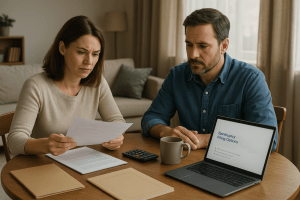
Can One Spouse File Bankruptcy Without the Other?
Can One Spouse File Bankruptcy and Leave the Other Unaffected? Can one spouse file bankruptcy without involving the other? The
Error: Contact form not found.
Lorem ipsum dolor sit amet, consectetur adipiscing elit. Ut elit tellus, luctus nec ullamcorper mattis, pulvinar dapibus leo.
Can one spouse file bankruptcy without involving the other? The answer is yes, but it depends on the specific situation. Whether you’re trying to protect your partner’s credit or manage separate debts, understanding your filing options is key.
Filing bankruptcy as an individual can help one spouse resolve personal financial issues without dragging the other into court. However, there are important factors to consider, like shared debt, property, and community income laws.
Bankruptcy doesn’t always require both spouses. Here are common reasons why one spouse might choose to file alone:
Whether you file Chapter 7 or Chapter 13, the court still considers the household’s income and assets, even if only one person files.
In community property states like California, Texas, or Arizona, the rules are different. Even if one spouse files for bankruptcy, creditors may still go after community property owned by both spouses.
Consulting a bankruptcy attorney is essential to determine how these rules apply to your marriage and state.
There are two main bankruptcy chapters for individuals:
This is the most common type used to address unsecured debts like credit cards and medical bills. One spouse can file Chapter 7 if they qualify under the means test.
This is a repayment plan over three to five years. Income from both spouses will likely be considered, even if only one is filing, since household income affects payment amounts.
In either case, be prepared to disclose total household income and assets, even when only one spouse files for bankruptcy.
Bankruptcy is a major financial decision that affects the entire household, even when only one partner files.
Questions to ask before deciding:
Getting professional legal guidance can help you make an informed decision and understand how different filing options may affect both parties
If you’re asking can one spouse file bankruptcy, the answer is yes—but not without some consequences. While one spouse can file individually, shared debts, community property laws, and financial disclosures can still impact both partners. The best approach is to assess your household’s full financial picture and explore whether joint or individual filing offers more protection and relief.
Still wondering, can one spouse file bankruptcy in your situation? Bankruptcy Attorneys can help you review your debts, income, and marital property to discuss which filing options may be appropriate. A free evaluation can reveal whether filing solo could protect your assets and your partner’s credit.
Contact us today to schedule your no-obligation case review and get answers tailored to your specific financial goals.
No. If your spouse is not listed on the bankruptcy or on any joint debts, their credit should remain unaffected.
Yes, for joint debts. Your spouse remains liable if they co-signed or jointly borrowed the funds.
Yes. Even if they don’t file, household income is used to assess eligibility and repayment ability.
It depends on state laws. In community property states, joint assets may be subject to collection.
It depends on the type of debt, ownership structure, and financial goals. A legal advisor can help decide the best path.
Attorney Advertising. This site is a legal marketing service and does not provide legal advice. Submitting information does not create an attorney-client relationship. Results are not guaranteed.

Can One Spouse File Bankruptcy and Leave the Other Unaffected? Can one spouse file bankruptcy without involving the other? The
| Cookie | Duration | Description |
|---|---|---|
| cookielawinfo-checkbox-analytics | 11 months | This cookie is set by GDPR Cookie Consent plugin. The cookie is used to store the user consent for the cookies in the category "Analytics". |
| cookielawinfo-checkbox-functional | 11 months | The cookie is set by GDPR cookie consent to record the user consent for the cookies in the category "Functional". |
| cookielawinfo-checkbox-necessary | 11 months | This cookie is set by GDPR Cookie Consent plugin. The cookies is used to store the user consent for the cookies in the category "Necessary". |
| cookielawinfo-checkbox-others | 11 months | This cookie is set by GDPR Cookie Consent plugin. The cookie is used to store the user consent for the cookies in the category "Other. |
| cookielawinfo-checkbox-performance | 11 months | This cookie is set by GDPR Cookie Consent plugin. The cookie is used to store the user consent for the cookies in the category "Performance". |
| viewed_cookie_policy | 11 months | The cookie is set by the GDPR Cookie Consent plugin and is used to store whether or not user has consented to the use of cookies. It does not store any personal data. |